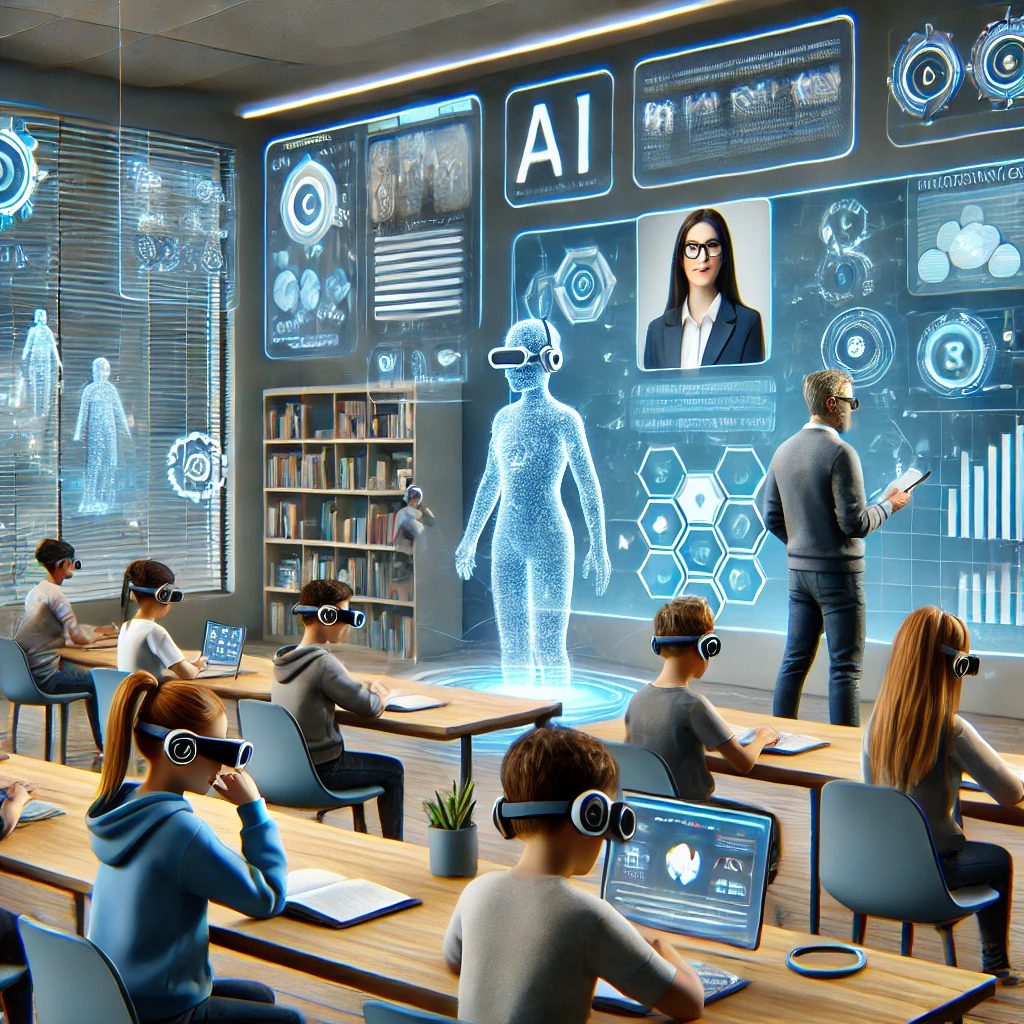difficulty
How StacksGather Sees AI Transforming Education in 2025
M
Muhammad Aamir Yameen
03-05-2025
35 mint mint read

Introduction
Artificial Intelligence (AI) is revolutionizing every industry, and education is no exception. As we enter 2025, AI’s influence on education is more significant than ever. From personalized learning experiences to intelligent tutoring systems, AI is reshaping how students learn and how educators teach. StacksGather envisions a future where AI transforms traditional educational models into more interactive, adaptive, and efficient systems. In this article, we explore how AI is shaping education, its benefits, challenges, and what the future holds.
The Evolution of AI in Education
AI-Driven Personalized Learning
One of AI’s most significant contributions to education is personalized learning. AI algorithms analyze students’ learning patterns, strengths, and weaknesses to tailor content specifically for them. Instead of a one-size-fits-all approach, students receive customized materials that enhance understanding and retention. For instance, platforms like Coursera and Khan Academy use AI-driven recommendation engines to suggest courses based on students’ progress and interests.
SEO Keywords: AI in education, personalized learning, adaptive learning, AI-powered education, AI-driven teaching
AI-Powered Tutors and Virtual Assistants
AI-driven tutors are revolutionizing how students receive help outside the classroom. These virtual assistants can answer questions, provide explanations, and offer additional resources, making learning more accessible. AI-powered chatbots like IBM’s Watson Tutor and Duolingo’s AI coach assist students in real-time, ensuring they receive instant support without waiting for human intervention.
SEO Keywords: AI tutors, virtual assistants in education, chatbot learning, AI mentorship, AI teaching assistant
Smart Content and Automated Assessments
AI enables the creation of smart content, such as interactive textbooks, video lectures, and dynamic quizzes that adapt to students' comprehension levels. Additionally, automated grading systems powered by AI save educators countless hours by evaluating assignments, essays, and even coding exercises. Companies like Turnitin use AI to assess written assignments for originality and quality, ensuring academic integrity.
SEO Keywords: smart learning content, AI assessments, automated grading, AI-powered learning materials, digital textbooks
Enhancing Educators’ Capabilities with AI
AI for Data-Driven Teaching
AI is not just for students; it significantly benefits educators as well. Teachers can leverage AI-powered analytics to identify struggling students and adjust teaching methods accordingly. AI-driven insights help instructors refine lesson plans, making them more effective and engaging. Moreover, AI chatbots assist in administrative tasks, allowing teachers to focus on actual teaching rather than paperwork.
SEO Keywords: AI for teachers, AI analytics in education, AI in lesson planning, AI-driven teaching methods
AI in Special Education
AI is making education more inclusive for students with disabilities. Speech recognition software, text-to-speech tools, and AI-driven sign language interpreters help students with visual, hearing, or learning disabilities engage in education more effectively. Microsoft’s Seeing AI and Google’s Lookout app assist visually impaired students by describing surroundings and reading text aloud, making learning more accessible.
SEO Keywords: AI in special education, AI for disabled students, AI accessibility tools, inclusive education technology
Gamification and AI in Education
Gamification—using game elements in non-game environments—enhances student engagement and motivation. AI-powered gamified learning platforms adapt difficulty levels based on students' progress, making learning fun and interactive. For example, platforms like Prodigy and Kahoot use AI to create personalized game-based learning experiences that keep students interested while reinforcing educational concepts.
SEO Keywords: AI gamification, AI-driven game-based learning, AI educational games, AI-enhanced learning experience
AI-Driven Career Guidance
Choosing the right career path can be daunting for students. AI-powered career counseling tools analyze students’ skills, interests, and academic performance to suggest suitable career paths. Platforms like Pymetrics and LinkedIn Learning use AI to match students with job opportunities and skill-development courses, ensuring they are well-prepared for the workforce.
SEO Keywords: AI career guidance, AI in job placement, AI-based career counseling, AI job recommendations
Ethical Considerations and Challenges
Despite AI’s benefits, its integration into education presents challenges. Data privacy concerns, bias in AI algorithms, and the digital divide are critical issues that need to be addressed. Educational institutions must ensure that AI tools are unbiased, transparent, and protect student data. Furthermore, AI should complement teachers rather than replace them, preserving the human element of education.
SEO Keywords: AI ethics in education, AI data privacy, AI bias in learning, challenges of AI in education
The Future of AI in Education
Looking ahead, AI will continue to evolve and transform education in ways we have yet to imagine. Innovations like AI-driven virtual reality classrooms, blockchain-based academic credentials, and emotion-recognition AI could redefine how knowledge is delivered and assessed. As StacksGather envisions, the future of education lies in harnessing AI’s potential to create smarter, more inclusive, and more effective learning environments.
SEO Keywords: future of AI in education, AI-powered classrooms, AI education trends, AI advancements in learning
Conclusion
AI is no longer a futuristic concept—it is actively shaping the education landscape today. By personalizing learning, automating assessments, assisting educators, and making education more inclusive, AI is transforming how we acquire and impart knowledge. As we move into 2025, institutions, educators, and students must embrace AI-driven innovations to unlock new possibilities in education. StacksGather remains at the forefront of this transformation, pioneering solutions that make learning more effective, accessible, and engaging for everyone.
(References:)
- Luckin, R., Holmes, W., Griffiths, M., & Forcier, L. B. (2021). Artificial Intelligence and Education: Promise and Implications for Teaching and Learning. UNESCO.
- Woolf, B. P. (2020). AI in Education: Promises and Implications for Learning and Teaching. MIT Press.
- Microsoft AI in Education. (2024). Available at: https://education.microsoft.com
- IBM Watson Education. (2024). Available at: https://www.ibm.com/watson/education
- Duolingo AI-Powered Learning. (2024). Available at: https://www.duolingo.com
- StacksGather. (2024). Available at: https://stacksgather.com/
M
Muhammad Aamir Yameen
Software Engineer